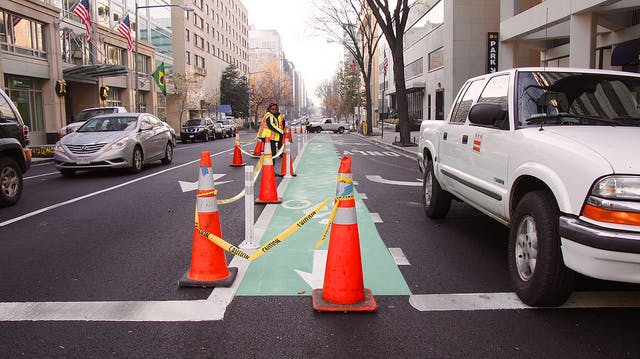For Many States, Budget Mismanagement Blocks Bike Projects
By: PeopleForBikes Staff

Bike infrastructure delays tend to be blamed on a lack of funding, but there’s often more to the story. Even when funds are made available, states must follow through to ensure that the money is actually used.
Each year, states receive funding through the Transportation Alternatives Program (TAP) — about $850 million total. While this money is designated for biking and walking projects, some of these funds ultimately get put to use in other areas. Why? Two reasons: First, some states transfer their TAP funds to other transportation uses usually going to road projects (statutory language allows states to transfer up to 50 percent of TAP funds to other transportation projects). This is often done as a band-aid solution to make up for transportation budget shortfalls (a decision PeopleForBikes, along with state and local advocacy groups, strongly opposes). The second reason is even more concerning: The money simply isn’t spent.
TAP funds work on a sort of match system, where states submit plans for a project, then federal funds are applied. If no plans are submitted, the biking and walking funds are either rescinded and returned to the federal government, or the funds lapse and become categorized as unallocated (essentially disappearing from the budget). Most transportation programs allow four years to allocate TAP funds before they lapse.
What’s eligible for TAP funding? (Definitions of these categories can be found on page 8 of the report.)
- Pedestrian and bicycle facilities
- Safe routes for non-drivers
- Conversion of abandoned railway corridors to trails
- Scenic turnouts and overlooks
- Outdoor advertising management
- Historic preservation and rehab of historic transportation facilities
- Vegetation management
- Archaeological activities
- Stormwater mitigation
- Wildlife management
- Recreational Trails Program
- Safe Routes to School Program
Rails to Trails Conservancy recently published a comprehensive report about how states use — or abuse — their TAP funds. States like New Jersey, North Carolina and Maryland allowed millions of funding dollars to lapse without being put toward bike or pedestrian projects. Perhaps more alarmingly, the total amount of TAP funds nationally that lapsed increased markedly from $4.77 million in 2016 to $18.42 million in 2018. Texas let far fewer funds lapse, but walking and biking projects still suffered through the transfer of $118 million of TAP funds to roads and other projects over a five-year period.
Rails to Trails notes in its report that over the last five years, close to $435.8 million of TAP funding has been transferred to road projects and an additional $23 million lapsed — these funds were lost because they weren’t spent in time.
A review of how states spend money gives insight into how transportation departments prioritize bike projects — or don’t. States like Connecticut and Oregon sometimes transfer their funds, but in a way that actually allows them to better plan and execute active transportation programs. Some figures also give insight to changing agency priorities or policies. For example, despite Texas’ high figure for total TAP transfers over the last five years, the state reported zero transfers in 2017. In good news, the amount of total TAP transfers that occurred nationally decreased dramatically from $137.65 million in 2016 to $16.06 million in 2017.
Obtaining federal funding that is dedicated to bicycle and pedestrian infrastructure is one of PeopleForBikes’ most import objectives. However, obtaining these funds is really just the first step toward getting projects on the ground to benefit bike riders; an equally important step is ensuring states use the funds for their intended purpose. PeopleForBikes is committed to supporting state and local advocacy groups as they work with their state DOTs and other transportation stakeholders to safeguard and protect TAP funds.
